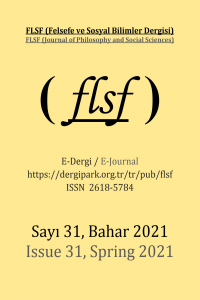Abstract
Bu çalışma, zihin felsefesinde ‘‘Qualia problemi’’ olarak adlandırılan sorunu Frank Jackson’ın bilgi argümanına odaklanarak tartışmayı amaçlamaktadır. Bu bağlamda, bilgi argümanının bilincin fizikalist açıklamalarına karşı ciddi bir tehdit oluşturmadığı tezi çalışmanın nihai hedefidir. Bu tezi savunurken, Daniel Dennett’in ‘‘RoboMary Neyi Biliyor’’ adlı çalışması, ve karşıt görüş olarak ise Torin Alter’ın ‘‘Deneyimsiz Fenomenal Bilgi’’ adlı çalışması referans alınacaktır. Daha sonra, her bir görüş tek tek ele alınacak ve eleştirel bir değerlendirmeye sunulacaktır. Alter, makalesinde Dennett’in yanı sıra Pete Mandik’in konuyla ilgili argümanına da atıfta bulunsa da, bu çalışma Dennett’in argümanıyla sınırlı kalacaktır. Sonuç olarak, bilgi argümanının bizi fizikalizmin yanlış olduğu sonucuna götürmeye yetmediği savunulacaktır.
Keywords
References
- Alter, Torin. 2008. “Phenomenal Knowledge Without Experience.” The Case for Qualia. Ed. Edmond L. Wright. Mit Press.
- Dennett, Daniel. 2006. “What RoboMary Knows.” Phenomenal Concepts and Phenomenal Knowledge: New Essays on Consciousness and Physicalism. Eds. Torin Alter and Sven Walter. Oxford University Press.
- Jackson, Frank. 1982. “Epiphenomenal Qualia.” The Philosophical Quarterly. 32: 127, pp. 127-136. Oxford University Press.
- Jackson, Frank. 1986. “What Mary Didn’t Know.” The Journal of Philosophy. 83:5, pp. 291-295.
- Lewis, David. 1983. “Postscript to ‘Mad Pain and Martian Pain.’” In Philosophical Papers. Vol. 1. Oxford University Press.
- Lewis, David. 1990. “What Experience Teach.” In Lycan 1990.
- Nemirow, Laurence. 1980. “Review of Thomas Nagel’s Mortal Questions.” Philosophical Review 89. 473-477.
- Nemirow, Laurence. 1990. “Physicalism and the Cognitive Role of Acquaintance.” In Lycan 1990.
Abstract
This paper intends to research the problem of Qualia in the philosophy of mind by focusing on Frank Jackson’s knowledge argument. In this context, we will try to show why the knowledge argument is not a sound argument against physicalist accounts of consciousness. To support our thesis, we will examine Daniel Dennett’s paper ‘‘What RoboMary Knows’’; and as an opponent view, we will discuss Torin Alter’s paper ‘‘Phenomenal Knowledge Without Experience’’. Then, each arguments will be taken separately and we will address them step by step. Although Alter mentions Pete Mandik’s argument along with Dennett’s argument in his paper, we will restrict ourself with only Dennett’s RoboMary argument and Alter’s counter-arguments to this. In conclusion, we will defend the argument that the knowledge argument is not cogent and it is also not sufficient to claim that physicalism is false.
References
- Alter, Torin. 2008. “Phenomenal Knowledge Without Experience.” The Case for Qualia. Ed. Edmond L. Wright. Mit Press.
- Dennett, Daniel. 2006. “What RoboMary Knows.” Phenomenal Concepts and Phenomenal Knowledge: New Essays on Consciousness and Physicalism. Eds. Torin Alter and Sven Walter. Oxford University Press.
- Jackson, Frank. 1982. “Epiphenomenal Qualia.” The Philosophical Quarterly. 32: 127, pp. 127-136. Oxford University Press.
- Jackson, Frank. 1986. “What Mary Didn’t Know.” The Journal of Philosophy. 83:5, pp. 291-295.
- Lewis, David. 1983. “Postscript to ‘Mad Pain and Martian Pain.’” In Philosophical Papers. Vol. 1. Oxford University Press.
- Lewis, David. 1990. “What Experience Teach.” In Lycan 1990.
- Nemirow, Laurence. 1980. “Review of Thomas Nagel’s Mortal Questions.” Philosophical Review 89. 473-477.
- Nemirow, Laurence. 1990. “Physicalism and the Cognitive Role of Acquaintance.” In Lycan 1990.
Details
| Primary Language | English |
|---|---|
| Subjects | Philosophy |
| Journal Section | Research Article |
| Authors | |
| Publication Date | May 12, 2021 |
| Submission Date | February 11, 2021 |
| Acceptance Date | April 9, 2021 |
| Published in Issue | Year 2021 Issue: 31 |
Starting from 2024, our journal will be published in 3 issues as two regular and one special issues. These issues will be published In May (regular issue), September (special issue) and December (regular issue).
Only articles within the scope of the file will be included in our special issue.
Thank you for your attention.

